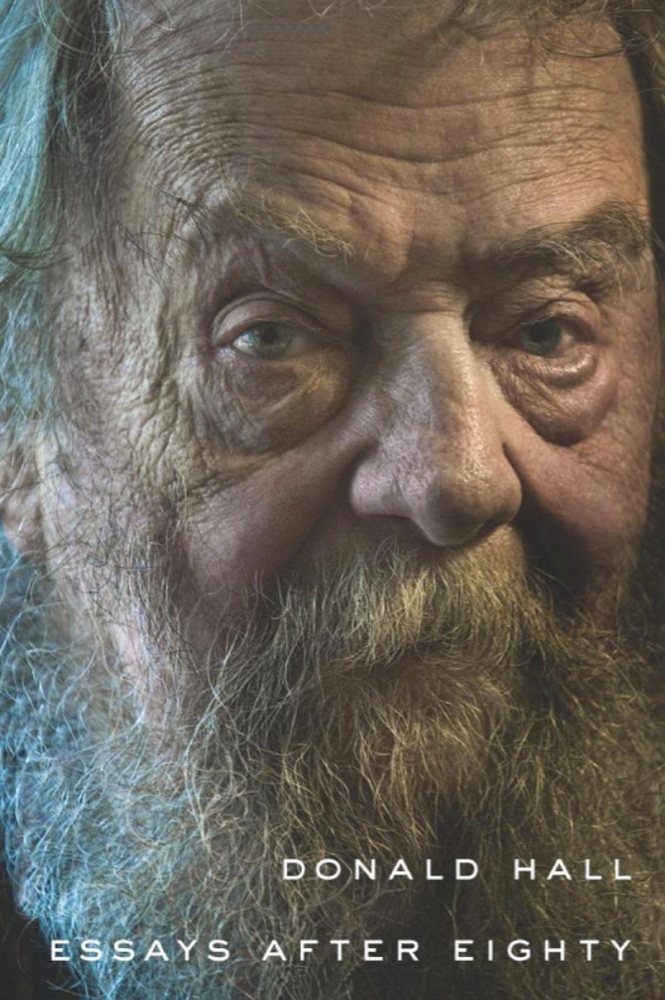The cover of Donald Hall’s new book, “Essays After Eighty,” shows a photo of the author head-on, his face a roadmap of time and wear, with a beard that sprawls every which way. The photo is bold, in-your-face, just like the man himself. Hall curses the invisibility that comes with old age and is having none of it. He aspires to be “grubby and noticeable.”
A former U.S. Poet Laureate, winner of the National Medal of Arts and author of some three dozen books, Donald Hall is a master of language, observation and surprise.
In the opening essay, Hall is sitting by the window at Eagle Pond Farm, his ancestral New Hampshire home, where a sense of meandering calm prevails. The chair is his perch, the hub of an ever-shrinking universe. First came the death of his wife, poet Jane Kenyon, from leukemia, and later the onset of his own disability. Hall describes his growing unsteadiness, the “widower food, mostly Stouffer’s” that he eats, the sameness of his days. The essay is a chronicle of loss, poignant and blunt.
But don’t be fooled. Even in his 80s, Hall remains a force whose new book is laced with defiance, insight and more than the occasional zinger. In the title essay, Hall expounds on the writing life and how it has changed with time. “Poems are image-bursts from brain-depths, words flavored by buttery long vowels,” he writes. “The sound of poems is sensual, even sexual.” Yet these days, he relegates himself to writing in prose. He contends that male poets require a charge of hormones in order to produce poetry. “As I grew older,” he says, “poetry abandoned me. How could I complain after 70 years of diphthongs?”
In “Physical Malfitness,” Hall describes a lifelong aversion to exercise and sports, and his fondness for the female trainer who helps him to forestall a wheelchair. “Exercise is boring,” he says. “Everything is boring that does not happen in a chair (reading and writing) or in bed.” Which in no way deters him as a sports fan. Hall has written two books about baseball, and he watches the Red Sox religiously on TV. “Everyone who concentrates all day, in the evening needs to let the half-wit out for a walk,” he says.
In “No Smoking,” Hall surveys our culture’s repudiation of cigarettes, from early product disclaimers to current bans on smoking. All the while, he delights in his shameless rebellion as a smoker, realizing that “by the millennium, everyone decent knew that smoking was unforgivable, like mass murder or Rush Limbaugh.”
Since Jane Kenyon’s death nearly 20 years ago, Hall never remarried. He has dated a number of women, most of them young enough to be mistaken for daughters. These days, Hall has settled into a life that relies on four women – a bookkeeper, trainer, housekeeper and companion – all in their 50s. We come to know these women in the book and appreciate their respective roles.
“Essays After Eighty” is a travelogue of sorts, its 14 pieces roaming through various chapters of Hall’s life – trips to the nation’s capital and abroad, teaching posts, editorships, poetry readings. Along the way, he opines about garlic and beards, rejection slips and the hazards of smoking while driving. The essays are discursive in style, making sundry detours to suit the author’s whim. While old age is a dominant theme in the book, Hall is reliably colorful and eloquent across the board. He does not dwell on the insults of age. At 85, even he is surprised by his own cheerfulness.
Joan Silverman writes essays, op-eds and book reviews. Her work has appeared in The Christian Science Monitor, Chicago Tribune and Dallas Morning News.
Send questions/comments to the editors.



Comments are no longer available on this story